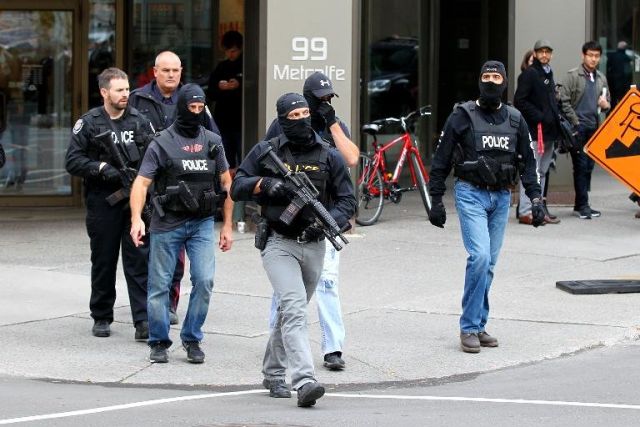
The Vancouver Sun published a description on October 24 of the troubled man who killed a guard in Ottawa two days before and then entered Canada’s parliament building carrying his gun. The 32-year-old man, Michael Zehaf-Bibeau, was shot and killed by police.
The Sun reporters spoke to people who knew Zehaf-Bibeau while he lived in Vancouver during recent years. They described an angry and troubled man grappling with mental illness and drug addiction.
Zehaf-Bibeau lived in Vancouver, Calgary and Montreal at various times in the past three years. In Vancouver in 2011, he staged a robbery of a McDonald’s restaurant in order to get himself placed in jail for what he considered would be a form of drug treatment.
Before his shooting rampage in Ottawa, Zehaf-Bibeau had been living in a homeless shelter in Ottawa for several weeks. Just before that, he was living in a shelter in Vancouver.
Two days earlier, another Canadian soldier was killed by a man with mental illness, in St Jean-sur-Richelieu. The man drove his car into two uniformed soldiers.
Political leaders on all sides in Ottawa are calling Zehaf-Bibeau’s killing of a soldier and his entry into the parliament building an act of “terrorism”. It turns out that the deranged gunman’s actions are a political godsend for the government of Stephen Harper.
Stung and weakened by revelations by Edward Snowden and other civil rights advocates about the “Five Eyes” US-led spying alliance, of which Canada is a full partner, the government has been seeking to expand its Five Eyes participation. This includes giving more powers to its intelligence services.
An October 17 Ottawa Citizen article explained some of the spying powers the government is seeking to expand. It includes removing the right of people facing criminal or political charges to question accusations by undercover police in court. Opposition parties have offered nothing more than tepid questioning of the government’s intentions.
Now the government hopes to pile on extra measures. Harper and his ministers are indicating plans to create laws allowing preventive arrests. On October 24, public safety minister Steven Blaney told the CBC Power & Politics program: “When we tabled the Combating Terrorism Act, weactivated some capability for our law enforcement to do some [preventive arrests].
“What we are realising now is there are some thresholds that would need adjustment so that it is more practical and more functional to intervene.”
Harper told Canada's House of Commons on October 23: “In recent weeks, I’ve been saying that our laws and police powers need to be strengthened in the area of surveillance, detention and arrest. They need to be much strengthened, and I assure you, Mr Speaker, that work which is already underway will be expedited.”
The hysteria and posturing in parliament and the mainstream media over Zehaf-Bibeau’s actions posit a “coming of age” of an innocent country, Canada, in a world awash with war and terrorism.
Columnist Rick Salutin answers that absurd claim in a column in the October 24 Toronto Star. He points to Canada’s participation in most of the major wars of the 20th century and its 1970 declaration of martial law in response to a rising movement for Quebec independence.
It is ironic, but fitting, that the new film
Democracy Now! said on October 23: “The new documentary offers an inside look at what transpired in a Hong Kong hotel room over eight days in June 2013 when Snowden first met with Laura Poitras, Glenn Greenwald and Guardian reporter Ewen MacAskill to leak a trove of secret documents about how the United States had built a massive surveillance apparatus to spy on Americans and people across the globe.”
Rafal Rohozinski, the CEO of a online intelligence firm in Ottawaspoke, spoke to CBC Radio One’s As It Happens about the shootings in Ottawaon October 23. He says the likely cause of the two recent killings of soldiers in Canada was the documented mental illnesses of the two perpetrators.
The cause of the incidents may well be the cuts begun decades ago in Canada to mental illness support that created a “deinstitutionalisation” of mental health treatment.
The emotions and rhetoric spilled over the tragic deaths of two Canadian soldiers contrasts with the silence over the ghastly news from Ukraine in the days before. The New York Times and Human Rights Watch each revealed in separate studies that the NATO-backed government of Ukraine, also supported by Canada, is using cluster weapons in its war against the rebellious population in the country's east.
The 2008 Convention on Cluster Munitions prohibits the use, transfer and stockpile of cluster bombs. These type of explosive weapon s scatter multiple submunitions (“bomblets”) over a geographical area.
The treaty has been signed by 108 states and 87 have ratified or acceded to it. Countries that have not signed the treaty include Ukraine and the United States. Canada has signed it, but the Harper government has refused to present a vote to ratify it to parliament.
The war in eastern Ukraine has killed thousands of people and created more than 1 million refugees. The news of the use of cluster weapons has not drawn a peep from parliamentarians in Ottawa. CBC News has kept the story off its website.
Some print dailies in Canada have not reported the story. Those which have, including the Globe and Mail and Toronto Star, have limited their print reporting to wire service stories that focus on predictable Ukraine government denials.
So some forms of “terrorism, which are not terrorism at all, receive blanket news coverage and political attention, but the large-scale terrorism uncovered in Ukraine is an embarrassment best left unreported.
[Reprinted from www.rogerannis.com.]
Like the article? Subscribe to Green Left now! You can also like us on Facebook and follow us on Twitter.